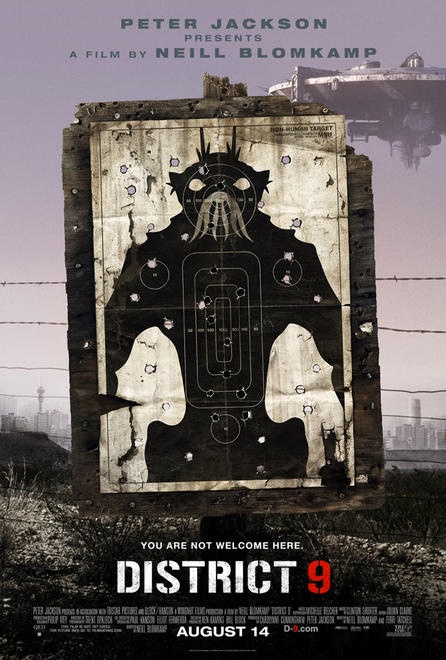 District 9's premise, "what if Aliens came to Earth, not in war or peace, but poverty and desperation?" can be thought of as a return to classic sci-fi form, insofar that it is less concerned with the fantastic trappings of its own genre (laser gunfire, warp drives, paradoxes) , and more concerned with the scenario's social implications. The psuedo-documentary format is a brilliant frame for such examinations, because examining humanity is what documentaries do. We do eventually arrive at flashy firefights, foreign biology and space travel tropes as well, resulting in an intringuing, unique experience. Some critics, whose names I have made a point of not remembering, have complained that the film is simply a mishmash of old and familiar sci-fi tropes, and is therefore not original. Though honestly, if amalgamations cannot be considered original, Homer's a hack, Shakespeare's a schmuck and... you can see where I'm going with this.
District 9's premise, "what if Aliens came to Earth, not in war or peace, but poverty and desperation?" can be thought of as a return to classic sci-fi form, insofar that it is less concerned with the fantastic trappings of its own genre (laser gunfire, warp drives, paradoxes) , and more concerned with the scenario's social implications. The psuedo-documentary format is a brilliant frame for such examinations, because examining humanity is what documentaries do. We do eventually arrive at flashy firefights, foreign biology and space travel tropes as well, resulting in an intringuing, unique experience. Some critics, whose names I have made a point of not remembering, have complained that the film is simply a mishmash of old and familiar sci-fi tropes, and is therefore not original. Though honestly, if amalgamations cannot be considered original, Homer's a hack, Shakespeare's a schmuck and... you can see where I'm going with this.The film opens with a collage of interviews and handy cam footage which informs us that an alien ship arrived in the skies of Johannesburg, South Africa in 1982, and ever since, the area has been inhabitted by a populous of alien aliens (Guffaw!) referred to as the Prawns, presumably because Cthulhu-Grasshoppers takes too long to say. An insidious PMC known as Multi-National United (MNU) has seized control of the situation, and it quickly becomes apparent that one of their lackeys, a Wikus van der Merwe, is going to be our main character and he's about as likeable as a wet pair of good shoes; he is boringly average, socially awkward and naive in an way that is simutaneously obnoxious and pitiable, but you aren't going to throw him out because there's good there.
 If you think this is heavy-handed, you should check out the promotional website.
If you think this is heavy-handed, you should check out the promotional website.Things start to shift gears when Wikus gets sprayed with an alien chemical that (spoiler alert, last chance to turn back) gradually transforms him into a Prawn. Although it may not be all that original as hooks go, the twist works excellently as a plot device because it serves as the narrative's fulcrum, providing a convincing bridge for the disparate switch from docudrama to action thriller. Wikus' metamorphosis begins with his right arm, conveniently allowing him to use the alien weaponry coveted by tribalistic african gangsters and the scheming executives of MNU. All Wikus wants to do is go home to his loving new wife who is inconveniently the daughter of MNU's evil CEO. Since MNU is on high alert and anxious to sell Wikus to the military, he has to turn to the aliens to cure his condition. Carnage and gunfights ensue; the bloodiest seen since Watchman.
Yet District 9's sensationalized gore serves a purpose beyond the superficial: It establishes an atmosphere of intense brutality, which is quite appropriate for a movie set in a politically tense, refugee environment. Documentary fans may argue that the horrors of starvation, subjugation and degradation are brutal enough, and that watching people erupt into showers meat when blasted by lightning cannons only trivializes those subtler, truer horrors, and they may have a point. It's obvious that Blomkamp opted for "totally awesome" instead of social commentary in the final sequence where we see Wikus commandeer an alien battle mech and lays waste to scores of MNU soldiers. Then again, when Wikus is forced to fire a lightning cannon at a hooded, handcuffed prawn, it provokes sorrow and revulsion as opposed to stylized admiration.
That compromise between meaningful social examination and manic spectacle best describes my feelings toward District 9. It is engaging, both emotionally and intellectually, but part of me has to wonder what would have happened if things continued on at their slower initial pace. To a certain extent, it seems like we got to watch the fused halves of two seperate movies. I suspect that a big part of this has to do with the fact that Blomkamp was working on a budget of almost nothing; a condition that, when paired with passion and vision, produces truly remarkable things.
Truth be told, I'm worried about how the inevitable sequel (please come up with something more creative than District 10), will fare with a bigger budget and more press.

No comments:
Post a Comment